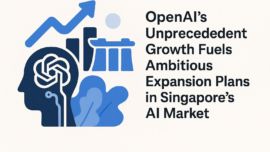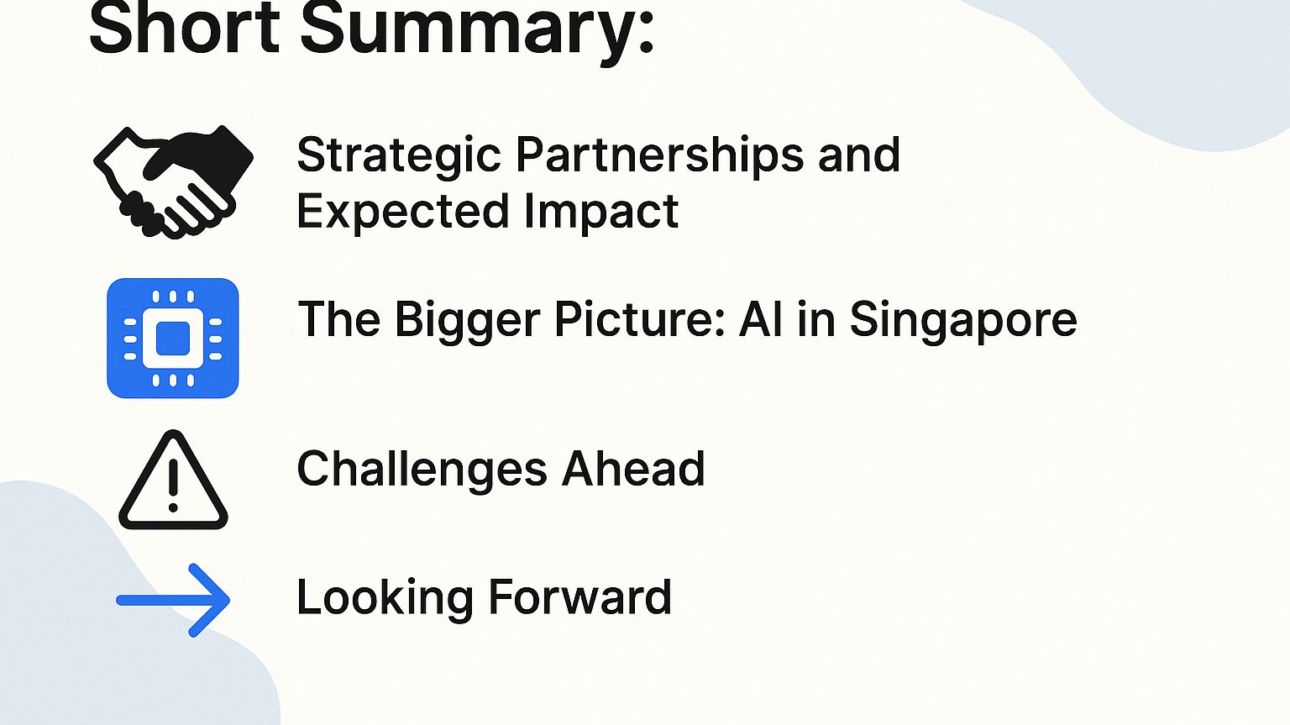OpenAI’s rapid growth trajectory has led the company to establish a significant presence in Singapore, marking it as a key player in the Asia-Pacific AI market. This strategic decision not only amplifies OpenAI’s global ambitions but also signals confidence in Singapore’s burgeoning technology landscape.
Contents
Short Summary:
- OpenAI has identified Singapore as a crucial hub in its efforts to expand its operations across the Asia-Pacific region.
- The company aims to hire between 50 and 70 employees in Singapore by the end of December 2024, enhancing its local footprint.
- Strategic partnerships with leading local organizations such as Singapore Airlines highlight OpenAI’s commitment to developing customized AI solutions tailored to the regional market.
OpenAI, the AI powerhouse known for its innovative technologies like ChatGPT, is stepping up its game in the Asia-Pacific arena with recent developments that strongly position Singapore at the forefront of its global strategy. Following an ambitious growth plan initiated in November 2024, OpenAI’s decision to establish a base in Singapore is seen as a testament to the nation’s advanced AI infrastructure and dynamic business environment.
To understand the importance of this move, let’s hear from Jason Kwon, OpenAI’s Chief Strategy Officer. In an insightful interview with The Straits Times, Kwon said, “Asia-Pacific is one of our fastest-growing regions in general – it’s about four times in growth year over year.” This revelation serves to underline the potential that the region holds for OpenAI, appealing not merely to its existing user base but also to a suite of burgeoning sectors ripe for technological advancements.
Reports suggest that OpenAI intends to ramp up its workforce in Singapore, targeting a headcount of 50 to 70 employees by the end of this year. Although specific figures regarding their current employee count remain undisclosed, the firm emphasizes that its local team will focus intricately on developing tailored solutions that meet the needs of Singaporean industries.
What’s particularly striking about OpenAI’s foray into Singapore is the endorsement from local industry leaders rather than a mere emphasis on products. Philbert Gomez, the head of Digital Industry Singapore and executive director at the Economic Development Board, remarked, “OpenAI’s scale and its large user base bring opportunities to benefit Singapore’s ecosystem of workers, startups, and tech firms.” This intertwining of local governance and global enterprise exudes a promising landscape for technological advancement.
Strategic Partnerships and Expected Impact
OpenAI isn’t entering this vibrant market alone. In fact, they’ve already made waves by collaborating with giants like Singapore Airlines (SIA), Grab, Sea Group, and even the Singapore Tourism Board. These partnerships showcase OpenAI’s commitment to not only setting up shop but actively integrating within the local industry landscape.
For instance, Singapore Airlines has already signed on with OpenAI, opting to integrate AI functionalities into customer service and operations. This breakthrough was given wings when SIA’s announcement showcased not just enhanced efficiency but also enriched customer engagement experiences. As Kwon elaborates, “It’s not so much about the models as it is about the product that we build around it, the experience around it.”
“OpenAI has been willing to build with us rather than offer us off-the-shelf capabilities, which gives us a lot of confidence in working together with them,” stated Gaurav Tandon, Vice President of Product and AI Innovation at Circles, one of the local companies leveraging OpenAI’s expertise.
This emphasis on co-building solutions is pivotal in a marketplace where customization and user experience dictate success. OpenAI plans to deliver adaptive AI solutions that resonate with local cultures and languages, thus stewarding a tech landscape that aligns more closely with user expectations. This local-knitted approach could be immensely beneficial in enhancing adoption rates in a region characterized by diverse linguistic and cultural landscapes.
The Bigger Picture: AI in Singapore
Singapore’s affinity for technology is evident, with reports indicating that one in four residents actively use ChatGPT. This high engagement presents OpenAI with a unique opportunity to harness local user data to finetune its AI offerings, especially within the framework of the National AI Strategy 2.0. Committing to a brighter future, the Singaporean government is dedicated to integrating AI technologies across sectors ranging from finance to logistics.
The integration of OpenAI’s AI tools into various sectors signifies a larger wave of change and innovation expected in Singapore’s tech ecosystem. As companies from various sectors align with OpenAI to leverage artificial intelligence, broader economic growth is anticipated, thereby catalyzing job opportunities, economic influx, and a strategic sailing into the dawn of the AI era.
However, this convergence brings forth potential challenges; ethical considerations, data privacy, and concerns over AI’s impact on jobs dominate discussions in tech circles. Redefining how AI is implemented necessitates a balanced approach that emphasizes transparency and security, particularly as startups begin relying on AI-driven ecosystems for operational efficiencies. OpenAI’s ongoing commitment to ethical AI development will be decisive in fostering public trust amid potential apprehensions.
Challenges Ahead
Despite the optimistic outlook, several challenges lie ahead. For one, the area of ethical AI remains a concern, with prominent figures in the AI research community vocalizing the need for robust frameworks to guide AI development responsibly. Furthermore, the potential impact on jobs poses questions about how the labor market will adapt to rapid automation.
Sam Altman, OpenAI’s CEO, expressed confidence about navigating these waters. In discussing long-term company goals, he said, “While we continue to invest heavily, we anticipate a steady emergence of profitability as we refine our strategies.” This remains a salient point for stakeholders looking to gauge OpenAI’s willingness to strike a balance between growth and ethical responsibility.
Looking Forward
As OpenAI sets its sights on further expansion, its deep-rooted integration within Singapore’s tech ecosystem signifies an exciting chapter in the AI realm. The blend of local specialization and global ambitions is a recipe for innovations that capture the hearts and minds of users across southeast Asia.
With strategic partnerships fueling growth and innovation in one of the world’s most developed tech markets, the implications of OpenAI’s presence are poised to resonate worldwide. Navigating through these opportunities and challenges will be critical for both OpenAI and its local collaborators as they strive to shape the future landscape of AI technology.
For those curious about how to leverage AI optimally, advances like OpenAI’s products offer exciting potentials that could be explored through platforms designed for efficiency. With tools like Autoblogging.ai, users can harness AI capabilities to create SEO Optimized Articles and navigate their digital presence effectively. As the challenges and prospects in AI unfold, adaptability will emerge as a significant driver for success not just for businesses, but for individuals leveraging technology in creative ways.
As we watch OpenAI’s journey unfold, it remains imperative for stakeholders and tech enthusiasts alike to stay informed about ongoing developments within the AI industry, both locally and globally, by following updates in dedicated Latest AI News and Latest SEO News.
Do you need SEO Optimized AI Articles?
Autoblogging.ai is built by SEOs, for SEOs!
Get 30 article credits!



